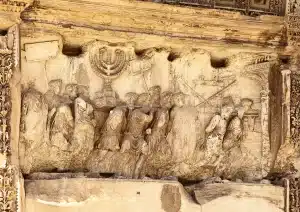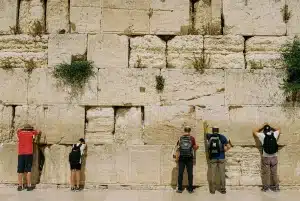Ever felt like you were in dire straits? There’s a period in the Hebrew calendar called “between the straits” and it starts on the seventeenth day of Tammuz. Why the seventeenth of Tammuz? This is traditionally the date on which the walls of Jerusalem were breached by enemies, after which it was conquered and the people exiled. A sad day indeed. The time of “dire straits” falls between this date and leads up to the ninth day of the following month in the Hebrew calendar, the month of Av.
The 9th of Av, or “Tisha B’Av” as it’s known in Hebrew is a day of mourning as many terrible things happened to the Jewish people on the same exact date. Similarly, according to Jewish tradition, the Seventeenth of Tammuz has seen a lot of tragedy as well. Time, it seems, goes around in circles. Solomon wrote:
What has been is what will be,
and what has been done is what will be done,
and there is nothing new under the sun. (Ecclesiastes 1:9)
There’s a time for everything. And often in the Jewish world, mourning and joy end up in the same place. In the Bible, there are indications that one day the Seventeenth of Tammuz will be a day of great joy.
The fast of the Seventeenth of Tammuz in Jewish tradition
It is said that several key events happened on the Seventeenth of Tammuz, most notably the breaching of the walls of Jerusalem. This occurred not only when the Babylonians came to destroy the city and exile the people in 587 BC, but also in the Roman destruction in 70 AD.
It’s also traditional to remember the time that Moses smashed the 10 commandments in horror as he saw the Israelites cavorting around the idol of the golden calf on the Seventeenth of Tammuz, although whether it really happened on that date or not we can’t be certain. Some would say that torah scrolls were burned and idols erected in the temple on this date, but again, whether it’s literally true that these things happened, or whether it’s just an opportunity to mourn for such tragedies that have happened throughout Jewish history I’ll leave to you to decide. Whatever your take on it, I think we can all agree a lot of very dark days have happened in Israel’s history, even in our times.
And history has a habit of rhyming.
 While people deny that the Jewish people are from the land of Israel, the Arch of Titus testifies to the fact: there’s a depiction of the sacking of Jerusalem still visible in Rome today, as the Romans carried off the temple menorah and expelled the Jewish people from their land.
While people deny that the Jewish people are from the land of Israel, the Arch of Titus testifies to the fact: there’s a depiction of the sacking of Jerusalem still visible in Rome today, as the Romans carried off the temple menorah and expelled the Jewish people from their land.
Those who take Jewish practice seriously will fast on this day, and recite special prayers for the event. The passage about the golden calf in Exodus 32 is read, and how Moses interceded for the Israelites at that time, asking for their forgiveness in Exodus 34. There is also a passage from Isaiah 55 which is read at this time. Isaiah 55 is a passage directed at the people of Israel, calling on them to turn to God and find Him. It assures Israel of finding compassion and forgiveness, and leads off with a promise of hope and joy, with a cryptic verse about the transformation that comes from salvation at the very end.
The fast of the Seventeenth of Tammuz in the Bible
The fast of the fourth month (Tammuz is the fourth month) is mentioned also in Zechariah 8, which is an incredible chapter. I’d really encourage you to read it if you get the chance. Here’s the most pertinent verse regarding the Seventeenth of Tammuz:
“Thus says the Lord of hosts: The fast of the fourth month and the fast of the fifth and the fast of the seventh and the fast of the tenth shall be to the house of Judah seasons of joy and gladness and cheerful feasts. Therefore love truth and peace.” (Zechariah 8:19)
But the whole of Zechariah 8, like Isaiah 55, echoes the repentance required together with the hope of joy to come. Of course, much of it is about the great day when the Messiah of Israel comes in glory to save. Here’s how the chapter starts off:
“Thus says the Lord of hosts: I am jealous for Zion with great jealousy, and I am jealous for her with great wrath. Thus says the Lord: I have returned to Zion and will dwell in the midst of Jerusalem, and Jerusalem shall be called the faithful city, and the mountain of the Lord of hosts, the holy mountain. (Zechariah 8:2-3)
 The prophet Zechariah foresees the time when all Israel will be gathered back to the land where they will finally worship Him as one:
The prophet Zechariah foresees the time when all Israel will be gathered back to the land where they will finally worship Him as one:
Thus says the Lord of hosts: “Behold, I will save my people from the east country and from the west country, and I will bring them to dwell in the midst of Jerusalem. And they shall be my people, and I will be their God, in faithfulness and in righteousness.” (7-8)
God has not given up on Israel
When we think of how Israel is currently seen among the nations, “as a byword of cursing”, as Zechariah puts it, the future God has planned is remarkable in its contrast. The punishments of Israel were laid out in all their gruesome glory as prophetic warnings in the Torah, but at the end of time when the Messiah returns, God is going to deal with the remnant of Israel very differently:
“But now I will not deal with the remnant of this people as in the former days, declares the Lord of hosts. For there shall be a sowing of peace. The vine shall give its fruit, and the ground shall give its produce, and the heavens shall give their dew. And I will cause the remnant of this people to possess all these things. And as you have been a byword of cursing among the nations, O house of Judah and house of Israel, so will I save you, and you shall be a blessing. Fear not, but let your hands be strong.” For thus says the Lord of hosts: “As I purposed to bring disaster to you when your fathers provoked me to wrath, and I did not relent, says the Lord of hosts, so again have I purposed in these days to bring good to Jerusalem and to the house of Judah; fear not. These are the things that you shall do: Speak the truth to one another; render in your gates judgments that are true and make for peace; do not devise evil in your hearts against one another, and love no false oath, for all these things I hate, declares the Lord.” (11-17)
The time of mourning and sorrow will come to an end, and even the memory of them will bring joy in the new situation:
“Thus says the Lord of hosts: The fast of the fourth month and the fast of the fifth and the fast of the seventh and the fast of the tenth shall be to the house of Judah seasons of joy and gladness and cheerful feasts. Therefore love truth and peace. (18-19)
We mourn now, but joy will come. But we see the importance of truth and peace—judgements that are true and make for peace. No devising of evil in our hearts, no false oaths or lying—it’s a time for truth and peace to reign.
The Jewish juxtaposition of joy and sorrow
At Jewish weddings the groom stamps upon a wine glass at the end of the ceremony, both to indicate the irreversible nature of the marriage vows and also as a reminder, in the most joyous of moments, of the devastating destruction of Jerusalem. This sorrowful psalm was written in exile in Babylon, and expresses the deep bond between the people of Israel and Jerusalem.
 If I forget you, O Jerusalem,
If I forget you, O Jerusalem,
let my right hand forget its skill!
Let my tongue stick to the roof of my mouth,
if I do not remember you,
if I do not set Jerusalem
above my highest joy!
(Psalm 137:5-6)
On the Seventeenth of Tammuz when the walls of the holy city were breached first by the Babylonians, then some 650 years later by the Romans, it must have felt like the world was ending. Jerusalem fell and Israel was scattered. On the Seventh of October when the border was breached and the kibbutzim were raided we had a taste of what those terrible events meant back in their day. These horrors should drive us to our knees. But even in our travail, God gives us great hope.
The Seventeenth of Tammuz is a time of mourning, a time to fast and repent. But we know that God does not stay angry forever. There is great redemption and joy to come. One day in the future, the fast of the fourth month will become a cheerful feast.
“Thus says the Lord of hosts: Peoples shall yet come, even the inhabitants of many cities. The inhabitants of one city shall go to another, saying, ‘Let us go at once to entreat the favor of the Lord and to seek the Lord of hosts; I myself am going.’ Many peoples and strong nations shall come to seek the Lord of hosts in Jerusalem and to entreat the favor of the Lord. Thus says the Lord of hosts: In those days ten men from the nations of every tongue shall take hold of the robe of a Jew, saying, ‘Let us go with you, for we have heard that God is with you.’” (Zechariah 8:20-23)
















